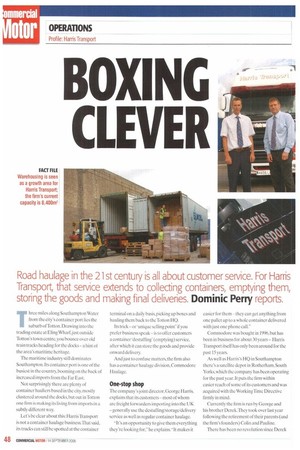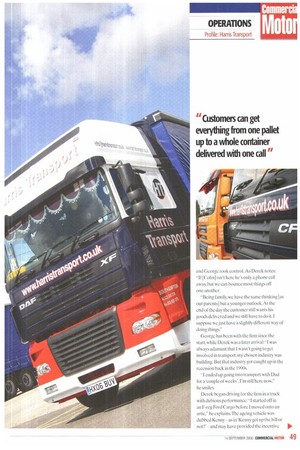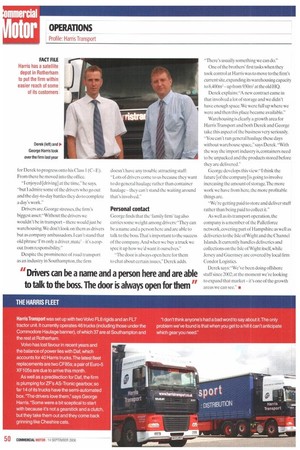BOXING CLEVER
Page 48

Page 49

Page 50

If you've noticed an error in this article please click here to report it so we can fix it.
Road haulage in the 21 St century is all about customer service. For Harris Transport, that service extends to collecting containers, emptying them, storing the goods and making final deliveries. Dominic Perry reports.
Three miles along Southampton Water from the city's container port lies the suburb of Totton. Drawing into the trading estate at Eling Wharf. just outside Totton's town centre, you bounce over old train tracks heading for the docks — a hint of the area's maritime heritage.
The maritime industry still dominates Southampton. Its container port is one of the busiest in the country, booming on the back of increased imports from the Far East.
Not surprisingly there are plenty of container hauliers based in the eity.mostly clustered around the docks, but out in Totton one firm is making its living from imports in a subtly different way.
Let's be clear about this: Harris Transport is not a container haulage business.That said, its trucks can still be spotted at the container terminal on a daily basis, picking up boxes and hauling them back to the Totton HQ.
Its trick —or 'unique selling point' if you prefer business speak — is to offer customers a container `destuffing' (emptying) service, after which it can store the goods and provide onward delivery.
And just to confuse matters, the firm also has a container haulage division, Commodore Haulage.
One-stop shop
The compaii),'s joint director, George Harris, explains that its customers — most of whom arc freight forwarders importing into the UK —generally use the destuffinWstorage/delivery service as well as regular container haulage.
"It's an opportunity to give them everything they're looking for," he explains.-It makes it easier for them—they can get anything from one pallet up to a whole container delivered with just one phone call."
Commodore was bought in 1996, but has been in business for about 30 years— Harris Transport itself has only been around for the past 15 years.
As well as Harris's HQ in Southampton there's a satellite depot in Rotherham. South Yorks, which the company has been operating for the past year. It puts the firm within easier reach of some of its customers and was acquired with the Working Time Directive firmly in mind.
Currently the firm is run by George and his brother Derek.They took over last year following the retirement of their parents (and the firm's founders) Colin and Pauline.
There has been no revolution since Derek and George took control. As Derek notes: "If [Colin] isn't here he's only a phone call away, but we can bounce most things off one another.
"Being family, we have the same thinking as our parents] but a younger outlook. At the end of the day the customer still wants his goods delivered and we still have to do it. I suppose we just have a slightly different way of doing things."
George has been with the firm since the start, while Derek was a later arrival:"I was always adamant that I wasn't going to get involved in transport: my chosen industry was building. But that industry got caught up in the recession back in the 1990s.
'I ended up going into transport with Dad for a 'couple of weeks'. I'm still here now," he smiles.
Derek began driving for the firm in a truck with dubious performance:'! started off in an F-reg Ford Cargo before I moved onto an artic," he explains. The ageing vehicle was dubbed Kenny — as in 'Kenny get up the hill or not? — and may have provided the incentive for Derek to progress onto his Class l (C+E). From there he moved into the office.
"I enjoyed [driving] at the time," he says, "but I admire some of the drivers who go out and the day-to-day battles they do to complete a day's work."
Drivers are, George stresses, the firm's biggest asset: "Without the drivers we wouldn't be in transport—there would just be warehousing. We don't look on them as drivers but as company ambassadors. I can't stand that old phrase 'I'm only a driver, mate"— it's a copout from responsibility."
Despite the prominence of road transport as an industry in Southampton, the firm doesn't have any trouble attracting staff: "Lots of drivers come to us because they want to do general haulage rather than container haulage— they can't stand the waiting around that's involved."
Personal contact
George finds that the 'family firm' tag also carries some weight among drivers:-They can be a name and a person here and arc able to talk to the boss.That's important to the success of the company. And when we buy a truck we spec it up how we'd want it ourselves."
"The door is always open here for them to chat about certain issues," Derek adds. "There's usually something we can do."
One of the brothers' first tasks when they took control at Harris was to move to the firm's current site, expanding its warehousing capacity to 8.400m2— up from 930m' at the old HQ.
Derek explains:"A new contract came in that involved a lot of storage and we didn't have enough space. We were full up where we were and then this place became available."
Warehousing is clearly a growth area for HarrisTransport and both Derek and George take this aspect of the business very seriously. "You can't run general haulage these days without warehouse space," says Derek. "With the way the import industry is, containers need to be unpacked and the products stored before they are delivered."
George develops this view:"I think the future [of the company] is going to involve increasing the amount of storage.The more work we have from here, the more profitable things are.
"We're getting paid to store and deliver stuff rather than being paid to collect it."
As well as its transport operation, the company is a member of the Palletforce network, covering part of Hampshire as well as deliveries to the Isle of Wight and the Channel Islands. It currently handles deliveries and collections on the Isle of Wight itself, while Jersey and Guernsey are covered by local firm Condor Logistics.
Derek says: "We've been doing offshore stuff since 2002; at the moment we're looking to expand that market —it's one of the growth areas we can see." •
































































































































































































